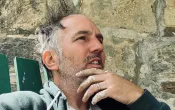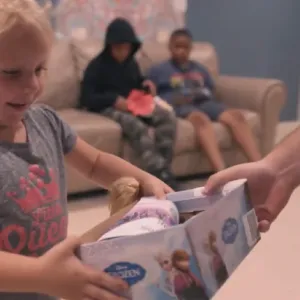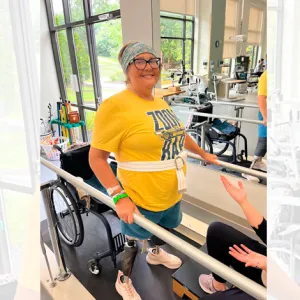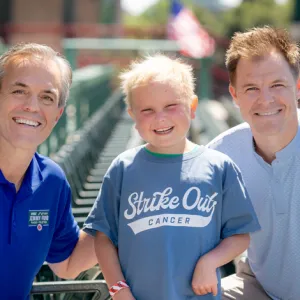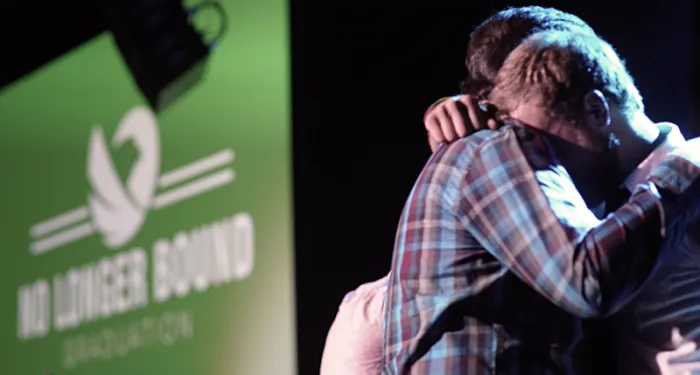
Edward Bailey
How to Transform a Life: No Longer Bound
Bailey and No Longer Bound help men break the chains of addiction. They’re 2X as effective as traditional rehab. But first, Bailey had to break free of his own.
It's my pleasure to introduce you to a truly incredible person.
I first met Edward Bailey about a year and a half ago. He immediately impressed me. He's the sort of individual who would be successful at anything.
Which makes it especially impressive that he decided to take on one of the biggest — and seemingly most intractable — problems our society faces today: Addiction.
A 'Never Say Die' Fight
It wasn't long ago that Bailey battled the issue personally. As you'll hear in this episode, the first time he found himself at No Longer Bound, the organization he now runs, he was at rock bottom.
But as you'll also hear today, Edward battled back from the brink through a combination of two things.
"One is surrender," Bailey says. "Then the other is the complete opposite. It's a 'never say die' fight. You're surrendering your own power and your own efforts that really got you to that point. But you're also choosing to not give up, no matter what."
Transforming Many Lives, One Life at a Time
Today, more than 14 years since Bailey fist entered No Longer Bound as an addict, he is the organization's executive director. And in this first episode of Season 4 of Crazy Good Turns, he shares his journey.
He'll tell you about the unique approach No Longer Bound takes in helping men escape addiction, and why it's more than twice as effective as traditional rehab.
Bailey also opens up about what he's learned along the way and explains how a "Burning Bush" moment ultimately led him, and his organization, to be what they are today.
FRANK BLAKE: If you're doing a movie of your life to this point, is that where the movie starts 14 years ago? Or is there some other place it starts?
EDWARD BAILEY: My story really almost ended before it started. I was 24 years old when I got to No Longer Bound
I hadn't been able to quit drugs and alcohol, kind of all my life growing up until that point. But at that point, I woke up one day and wanted to quit and physically could not. I was scared and knew that I was an addict.
I really believed that I had about a year left to live before I was either going to die or be in prison. And so I called the last guy got high with. I called him and said, "Hey, man, I'm going to go get help. I found this place called No Longer Bound. And you ought to come with me." He was a great kid, I actually went to elementary school with him. But we ended up being drug users together. And he said, "Hopefully I'll follow your example." And so I did go to No Longer Bound and prayed for this kid for a year after being there. And then a year later, I finally got to see him again, and it was standing over his casket.
And so I was standing over looking at this young man, and he was 23 years old. And I'm sitting there looking at him going, "He's never going to see his 30s. He's never going to be a dad. He's never going to be a husband." And so sad. And so that was almost my story that it was going to end before it ever really even started.
Frank Blake: So what got you to No Longer Bound to begin with? How did you get there?
Edward Bailey: Throughout high school, I started using. When I was 14 years old, for the first time, it was recreational and social, the way it starts with a lot of people. And I was always able to stop and then start and stop and start. And so for that reason, I really felt like I was in control of it. I knew it was a bad thing to do. I had grown up in a really great home, which doesn't make sense when we think about addiction on paper, and how who should and should not be an addict. But I had always been able to stop it. And so I remember this one day, I was 24 years old. And I was sitting there and I decided that things had gotten really out of control. When I say out of control, it's a really nice way of saying things were awful and gross. I was being taken to places you can't imagine, and finding myself in places that I swore I would never be.
And so I woke up one day and said, "I want to quit again. I'm going to quit today. That's what I'm going to do." And I was predetermined about it. And now literally, for the first time could not stop. It was not about me letting go of it. It was about it letting go of me. And I knew that I was in trouble, I knew I had gone too far. And I literally had this moment of going, "Oh God, I'm an addict."
Frank Blake: And what about No Longer Bound do you think? What connected with you? How did that work?
Edward Bailey: Yeah, we had just started looking for places. I went to my family and said, "I need help." They knew I needed help, they had been trying to do interventions, it was very obvious at that point, I needed help. And so as a family, we started looking for what recovery even meant, what it looked like, and what addiction meant. We were just really clueless to the whole issue. We heard this recommendation about two or three times of No Longer Bound. A friend told us about it, someone in a church told us about it. We found a list and it was on that list. And so we'd heard it enough times just to go and check it out.
Frank Blake: And what do you think made it special?
Edward Bailey: I remember the first day that I went there. That was an intimidating day to say the least. I was in the back of my parents' vehicle, pulled up, very humbling moment. I was a year out of college, I had just barely graduated college. And so I showed up there with a bag packed and essentially homeless and in desperate, desperate need. And I remember walking into an interview there. I was sitting there at a table with two staff members and my mother and father. And I remember the questions that they started to ask me were so brutally honest. And I remember sitting there and deciding even in that moment, "Okay, if I actually want to be free, this is the amount and the level of bravery it's going to take."
I remember recognizing that I was at the bottom. If I had it my way, and if my parents had it their way, and if God had it his way, then I was never going to be back here. So I decided to try to soak up every single lesson that I could get was at the very bottom of my life.
And so what ends up happening is this necessary orchestra or combination of two real things. One is surrender. Then the other is the complete opposite, which is a "never say die" fight. You're surrendering your own power and your own efforts that really got you to that point. And you're also choosing on the other side to not give up no matter what.
Frank Blake: And where do you think the energy and the commitment to persevere comes from?
Edward Bailey: Yeah, it was tiny steps. I mean, they asked me at one point, "What is your big dream? What's 'the good life' look like to you?" And I remember saying, "I want to be trusted." Which was a fantasy at that time. I wanted to be a husband, which was again, something that seems so impossible at that time. And my biggest dream was to be a dad. And all those things were so … They were big, hairy audacious goals. They were horizon level kind of goals. So at the time it was just tiny little steps. I remember again, I was essentially homeless and so they walked me into this room, it was going to be my first room, and it had a bag. And that was all I had to my name.
Edward Bailey: I remember looking at that room and having this moment and going, "Okay, this is what I have been trusted with, this room. This is mine." And so my goal is: If I can leave this room better than I found it, if I can be responsible for this thing that I'm being trusted with, maybe then I can be trusted with more. And so it was tiny, one step after the other.
Frank Blake: How do you get to the point where now you're running the same organization? How does that happen?
Edward Bailey: Well, it's really the same set of principles. If you walked into my office today, there's a letter that is framed higher than anything else in my office by way of placement. It's a letter to my successor. And the first day that I took this position, I wrote a letter to my successor and said, to him or to her, "I'm laying a foundation that someone else is going to build on and that one day I'm going to pass this off to you. And my hope is that I'm going to leave No Longer Bound, a better place and I found it." So it's the same philosophy that I had when I was trusted with that one room.
Frank Blake: Describe No Longer Bound a little bit. Because the other part of this is you have such a unique model and successful model for tackling the problem of addiction.
Edward Bailey: Essentially, we're dealing with adult males that are ages 18 up. They're coming to us just like I was when I was 24 years old. They're coming to us completely broken about to die, some of them have already died and have been brought back to life. They're either on their way to jail or coming out of prison.
They're really, really at their bottom. And so what makes No Longer Bound unique and kind of stand apart really in an industry that's really not that effective is some components that I found to be really valuable when rolled together and put into a model. And that's this long-term, residential, faith-based and clinical. Long-term is really important. So we're 12 months long-
Frank Blake: Versus typically-
Edward Bailey: Anything over 30 days is considered long term. It's usually not over 60 days and hardly ever over 90 days.
Frank Blake: And is that driven by the way insurance works?
Edward Bailey: Yeah, one-hundred percent. So what you have right now is a really broken revolving door in the treatment world, in the treatment industry. Let's see, four out of five people coming into treatment right now have been there before and the average stay, residentially, is under 30 days now. And so what's really happening is the payers are driving length-of-stay decisions and that's the insurance companies. And so when an insurance company feels like a particular client shouldn't be staying anymore, they stop paying. Then they want to start stepping into lower levels of care.
And so at No Longer Bound, 12 months residential ends up providing something that's really unique. And then we also do that in a faith-based setting with a clinical approach. And so those things end up creating some beautiful things for us. Time doesn't do anything in and of itself. If you go to stay a year in a chicken house, you don't come out a chicken. But time is a beautiful thing when you do the right thing with that time. And so that affords us the ability to mind deeper into those root causes that were driving their addiction.
It gives them time to really form lasting bonds and relationships with each other, which is really, really valuable and takes time to do. Gives them a year to practice their recovery in a safe setting, as opposed to being in a more dangerous, vulnerable setting outside. And then it gives us a year to prepare them for the workforce. And so we get to train them inside our industries that we have at No Longer Bound.
Frank Blake: Talk a bit about your industries.
Edward Bailey: Yeah. So we're really cool by the way of our funding. And so the way that we can keep someone there a year is because essentially the man in the program, what we call a resident, only has to pay for a third of the cost of his program. Donors are paying for the other two-thirds, which is basically anything that happens after 100 days. And then our industries pay for all of our action about 88% of our administration fees. those industries are thrift stores. So if people are donating, we would love for you to donate to us instead of anybody else.
We have a couple of thrift stores right now, one incoming and one at Woodstock. We have a furniture store really great reclaimed, beautiful furniture in the Johns Creek area. We have an auto program where you donate your automobile, RV, boat, or something to No Longer Bound. And then we also have a graphic design branding studio. So the guys work in one of those businesses while they're going through the program. And in turn, it funds their ability to be there for a year.
Frank Blake: And this dramatically improves the rate of recovery when they exit the program?
Edward Bailey: Yeah. Whether someone's coming out of prison or coming out of a treatment center, one of the biggest things they have a hard time doing is getting a job, because almost always there's a felony on their record. There is obviously a gap in their work history. Their past might be really colorful if you're looking at their demo paper, by way of hiring them. And so getting good sustainable employment is a real impediment to someone sustaining the recovery. And so we've got some incredible community partners that understand what our men are coming out of. And so we help get them all placed. And so they're stepping into not just a job, but a potential career and a source really to gain value in their life.
Frank Blake: And are there other comparable programs like No Longer Bound? Is there a group of you out there trying to change the way we handle addiction?
Edward Bailey: Yeah, interesting, you should ask. I've been traveling a lot in the last two years, a good bit in-state and a lot out-of-state, and I am finding some. There's a really great one in Kentucky called the [inaudible 00:17:48] house, but they're really our same model. And so what we're really looking at doing in the future, as we continue to build out our own organization, is bringing all these organizations together in association format. So then essentially you can have that same effective continuum of care, but on a nationwide level. And so we really increase access to what we would call effective treatment. And then it also increases our influence to really actually change the industry.
Frank Blake: Right. And so do you have a curriculum that goes with this?
Edward Bailey: Yeah. So right now, we're the only ones really with our curriculum. We call it "regeneration." That really steps you through our six phases of the program. And so what we'll end up doing is a big part of our vision is to share that curriculum. And so we're producing it now. As we begin to partner up with other treatment centers and kind of roll everything up in an association, it essentially creates a pipeline for us to be able to share that out to them.
Frank Blake: So talk a little bit about the other side of this for you, the leadership aspect of leading the organization. How natural has that been for you? What are the key learning points along the way?
Edward Bailey: I took over our founder back in 2014. I've been there for 14 years, kind of working my way through the organization whole time. Then I took over as Executive Director in the summer of '14.
Frank Blake: So first, what do you think had him saying, "All right, Edward, you're the person to run this to the next generation."
Edward Bailey: I give him a lot of credit. I basically came to him and said, "I feel like I'm supposed to take over after you." And to his credit, there was a 34-year-old graduate of his program sitting across from him and he didn't fall on the floor.
Frank Blake: Okay, well then step one more back from that. Why did you think that?
Edward Bailey: Well I had learned a dependent relationship on God essentially. And so when I first started to work at No Longer Bound, at that time, I was 25 years old, I had a college degree and had my life together, so I was ready to go. And I felt like God was telling me to stay at that point. And so that made no sense at the time. It was a small organization with about six employees and our founder. It wasn't necessarily an ideal place to work, and you didn't see a lot of career opportunities there. But I felt I was supposed to stay, I felt like that's what God was saying. And so at that point, I went to a few wise people in my life, my wife being one of them, I said, "I think this is what God's telling me to do. What do you think? Am I crazy?" And after they said, "No." Then I went and sat down with my co-founder.
Frank Blake: Yeah. And so he didn't fall off the chair.
Edward Bailey: He said, he just kind of shook his head. He said, "Okay." And so he said, "I could see that." He had poured his life into this place. He had started from nothing, been running it for 20 plus years. And so I think the idea of it probably sounded relieving to him: Someone would come along and not only honor what he had done, but really take his vision into the next generation of leadership.
Frank Blake: Then you take over. What have been the surprises? What did you say, "Oh, I didn't see that one coming."
Edward Bailey: One of the first things we did, as soon as I had taken over, was to go and get locked up in a rented house for three days to write a vision. So basically, we just started to fill up a whiteboard full of dreams. And just we're dreaming and dreaming. And we kind of had it broken up into categories. One of the categories was what we wanted our facilities to look like, and we kept referencing Eagle Ranch. If you've ever been to Eagle Ranch, in [inaudible 00:23:11] Georgia. It is 300 acres and the most beautiful, pristine camps you've ever seen. So we continue to mention this. And then at some point, somebody looks over the mantle of this rented lake house and sees a painting of an eagle. I'm like, "Okay." An eagle was … We're going to call the eagle, a symbol of this vision. Let it be our symbol. It's on the last day. We're out swimming in the lake. Next is a rented house, and I was just really scared honestly.
I was inspired but also scared that I was going to have to come back and say, "Here's what we're going to do." And I realized how big what we were saying we're going to do was. And about that time I look over and flying across the lake is a really big bird and it gets closer, I'm like, "That bird's got a white head." And a bald eagle lands in the tree about 15 to 20 yards right behind us. And I turnaround. Never seen an eagle in person. I'd definitely never seen one in North Georgia. I'm staring at this ego going, "Okay, this is real." That was my burning bush moment. And that was my confirmation.
So I knew that we were actually going to accomplish what we were setting out to accomplish. And so I came back and said, "All right, I'm going to call the founder of Eagle Ranch. And I'm going to beg him to mentor me because I need a mentor during the season." So I call it Eddie Staub is the Executive Director and founder at Eagle Ranch, and said, "You got to mentor me." I just begged and begged and begged and I said, "I'm not going to take no, so you might as well say, 'Yes,' because I'll show up at your doorstep." And so every since then, for the last four-plus years, I go and meet with him once a month we have lunch and he pours wisdom into me.
Frank Blake: Wow. That sounds like a crazy good turn on his part. Do you do the same for others?
Edward Bailey: I love to, absolutely do. Yeah, I just went and I got to spoke to a group of young men in their early 20s. They're just starting out their career and told them the same thing, the value of mentorship. So I really had to put my money where my mouth was because a couple of them have emailed me and called me since and said, "Thank you so much for sharing that would you do that for us?"
Edward Bailey: So I've got a couple of those lunches already set up and there's there's nothing that I enjoy more.
Frank Blake: What's the best piece of advice you got along this journey?
Edward Bailey: I tell you honestly it's practical and applicable I think for everybody and it definitely has been for me no matter what, if you lead an organization, you lead a department or whatever. But I spent four and a half years sitting with Eddie Staub, my mentor, another mentor of mine is Cheryl Bachelder.
Frank Blake: Cheryl is the CEO of Popeyes-
Edward Bailey: Yeah.
Frank Blake: And an amazing woman.
Edward Bailey: Yes, she is. And what all of these people talk to me about is actually taking care of myself. I think that there's something so valuable in that. To have yourself healthy is actually the best thing that you can do for the organization that you're leading, the department that you're leading, or just the relationship that you're in. If you take care of yourself, if you take time for your own soul, and you keep yourself healthy, then it is actually the best thing you can do for what you're trying to accomplish. Because you show up and you're your very best self. You show up and you're actually able to lead from a service perspective. You're not showing up exhausted with an empty tank, you're not trying to export dysfunction and unhealthy stuff. And so I think valuing taking care of myself has been pretty important.
Frank Blake: That's great piece of advice. What would you say people need to know about addiction that they don't know?
Edward Bailey: That they probably won't understand it. The best way I've been able to describe it is through what we would call one-dimensional thinking. And so Frank, when you make every decision that you make, you're going to make 50 to 100 decisions today, you think three-dimensionally.
The one dimension is the past, you think of all the lessons you've learned in your past, you think how those play into what your present is? And you think of the other dimension of the future, how are the decisions that I'm going to be making affect the future? And so we naturally just think three dimensionally in that way. While someone is in there and they have the disease of addiction, you only think in one dimension. You never think about the million times it didn't work in the past. You have no concept of who it's going to hurt in the future.
All you care about is what is in that moment, and how to get out of your pain in that moment. And so that's really almost impossible for someone actually to understand. And so I think it's learning to love someone and be empathetic, that's in their addiction while not being able to understand it yourself.
Frank Blake: Yeah, that's, that's powerful, difficult to do. I mean, do you have advice for people in dealing with that? I mean, as you say, you don't understand it, you're not going to have been there? What's the advice? Because it is an epidemic in our country.
Edward Bailey: Well, in general, what I'd say is when you think about those statistics, it can become so overwhelming that we end up just doing nothing sometimes.
Frank Blake: Right.
Edward Bailey: And so what I'd say is that it sounds a little philosophical, but I think it's really actually a good principle: You do for one what you wish you could do for everyone.
Another way say to say is you can't change the whole world, but you can change someone's whole world. And so you find a place where you can actually make a difference, and that may just be one person. But if everybody starts to do that, you effectively do move the needle of a problem.
And so that's the biggest thing. One, you do have to have healthy boundaries, if it's someone that is close to you. But at the same time, you pour into one person or one organization. I think that for us, that's what we love providing, is a place for someone like you or someone that's in community going, "I want to do something about this, but I feel overwhelmed by the size of it." And we say, "Oh, I got a young man's life that you can change. I have a real person that's sleeping in a real bed, that's coming from a real place of brokenness and you can save and change his life." And so finding somewhere we can make a difference, that's what I'd say.
Frank Blake: That's such a great answer. And I want to thank you because I've seen the difference you make in people's lives. And as I said at the start, it's amazing what you've done and continue to do with No Longer Bound and thank you. Thank you for your time.
Edward Bailey: My pleasure.
